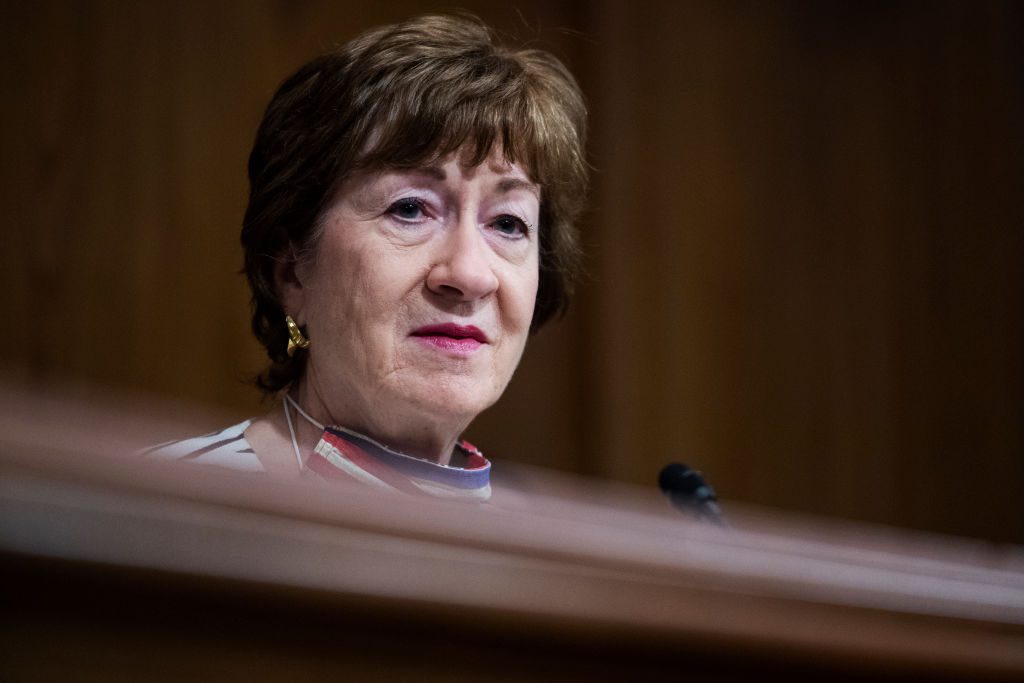The Decline and Fall of the New England Republicans

Lots of news out of the Democratic National Convention this week, even if it’s only of interest to politics junkies and Zoom call enthusiasts. I’ll have a roundup this weekend that hopefully will appeal to both demographics, but in the meantime, I want to highlight a mostly overlooked speaker: Sara Gideon from Maine. Gideon is running against Susan Collins, the longtime Republican senator and Pine Tree State political institution. And if polls stay the way they are, she’s going to win in November.
This is of interest nationally, first, because Collins has been doing a very delicate dance for a very long time. She’s touted herself as a moderate in a state that loves pragmatism, while also siding with the GOP on a significant number of major votes: for war in Iraq, against Obamacare, for the Trump tax cuts, for Brett Kavanaugh. Until now, she’s managed to make that work. Yet with the GOP increasingly lashed to Donald Trump, and Trump’s numbers underwater in Maine, her tightrope act may have finally come unbalanced.
There’s another reason this is of interest nationally: Collins is the last remaining Republican from New England elected to the federal level. If she goes, and Maine’s south-of-the-north Second Congressional District stays blue (a strong possibility), the GOP won’t have a single senator or congressman left from the region. That might sound unremarkable, given what a Democratic stronghold the Northeast is. But New England politics has always been more diverse and idiosyncratic than is sometimes assumed. Connecticut until recently had three out of its five congressional districts in play, ranging from its gilded Gold Coast to its more working-class east. Massachusetts famously sent Senator Scott Brown to Washington, nearly burying Obamacare in the process. Maine for many years was represented by two Republican senators. New Hampshire gave us several Sununus; Rhode Island more than one Chafee.
What happened? The trouble seems to have started in the aughts, when George W. Bush infused the Republican Party with a more Southern evangelical feel, not always a winner in places like Massachusetts. Bush’s tax cuts and deficits offended some of the region’s traditionally thrifty Republicans, while the Iraq war also created tension. Vermont’s Jim Jeffords left the party; so did Rhode Island’s Lincoln Chafee. From there, it was all downhill, as The Day, a Connecticut newspaper, argued in an editorial a few months ago:
As the conservative movement gained momentum in the Reagan and Bush years – and as Fox News ascended – moderate Republicans were disparaged as conservative apostasies.
Moderate congressional Republicans were marginalized further in 2012 with the rise of the brutal power politics from the freshmen Tea Party members in the House. Moderates took another hit in the Senate in 2014 when Majority Leader Mitch McConnell took control. …
New England voters in the last 20 years became disillusioned as the national GOP morphed into something more ruthless and reckless. They stopped sending Republicans to Congress.
This is a favorite narrative among moderates and ex-Republicans: the GOP lurched right! We got left behind! And there’s something to that, even if it’s difficult to trace a single rightward line among politics’ always-complex topography. But I would put it a different way: the Republican Party has ceased to be a coalition of values and has instead become a vanguard in the culture war. Once, the GOP’s emphasis on balanced budgets, careful progress, and preserving tradition appealed to Yankee sensibilities. Now, it’s become more representative of a certain lifestyle: outwardly Christian, pro-gun, pro-life, exhausted with political correctness.
That isn’t to say such people don’t exist in New England; they do and they vote Republican. But they’re nowhere close to the majority, which is why their candidates are faltering. The national GOP can seem strange to New Englanders, no less under Donald Trump’s Manhattan mouthiness than Bush’s chicken-after-church pieties. And perhaps that’s a good thing in its own way, regional diversity still alive and kicking, place still essential to politics. However it affects elections, we should seek to preserve the New England personality and keep it distinct from, say, the Texan one, even if we oppose it on various issues and trends. The nationalization of our politics must never flatten us into a dreary binary choice between warring camps.
Still, that leaves those old Yankee moderates like Susan Collins trapped between two falling stilts. Fortunately there’s good news for Republicans in New England: they still get elected at the state and local levels. They’re well represented on town councils and in gubernatorial seats—three out of the region’s six governors are in the GOP. The old New England model of electing stopgap moderate Republicans to executive offices lest Democratic legislators spend the place into the Atlantic still holds. The GOP will survive up north; it will just look different from the national Republican Party. And maybe that’s not the crisis we might make it out to be.